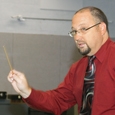As part of our anniversary celebration, we asked some of the best teachers we know to talk about what they have learned in their careers, the moments and students that never fade from memory, changes they would make to music education, and the keys to achieving a balance life. As sometimes happens with this type of reflection, we received many touching and inspiring responses. The flood of information was so great that we divided the project into two parts. A second installment will run in September. We are grateful to all who shared what they know and what they are still trying to learn.
Craig Fuchs
Pittsburg State University
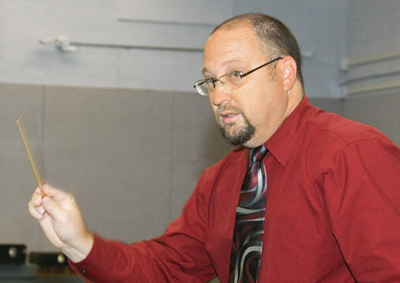
Most Memorable Student
In my last year at Shawnee Mission West High School in 1997, I taught a percussionist named Jonathan. He was one of those rare, wonderful students who just always did the right thing and was absolutely dependable. He was the student we all dream about having. Despite being just a sophomore, he exhibited tremendous leadership skills and quickly evolved into the leader of the percussion section. I think everyone in the section witnessed his ability to lead, and they were just fine giving him this position within their ranks.
Jonathan took my music theory class that year even though he had no intention of going into music for a career. He simply wanted to know how music worked. During the class the students each completed a composition project. We had just played Caccia and Chorale, which has the morse code section where Clifton Williams paid tribute to his former teacher through a morse code rhythm. Jonathan did the same by basing the piece on the morse code for my initials. How cool is that? Jonathan attended the U.S. Naval Academy, joined the US Marine Corps, and was one of the first squadron members to fly the V-22 Osprey. We still stay in touch, and he exhibits those same qualities he had as a young percussionist in my band program. He is talented, caring, brilliant, and still a great leader today.
Most Important Skill
I grew up in a generation where directors were autocratic and things could be pretty mean and verbally abusive at times. I used these same tactics my first few years of teaching, and I really wish I could go back and talk to those students who I berated right in front of their peers in class and apologize to them. Thankfully, we have evolved into more of an encouraging and supportive system of educating our students. Sure, we still have to have discipline and remind students of the standards at times, but overall the approach to working with students in the classroom has changed for the better over the past 30 years. We need to live and work in an environment of mutual respect between the teacher and the students.
One Change for Music Education
I may offend some with this, but I really would like to see marching band move away from the major competitive arena a bit. I think there is a great deal of time, money, and energy spent on a 61/2 to 7 minute show that could be used in other areas of educating students. I was as competitive as anyone when I taught high school, but in October it was done and it was time to put our energy into concert season and solo and ensemble festivals. I think the schools that have moved back to a Friday night football game band and perhaps just a few mild festivals are making good decisions. In our area, those schools have enrollments that are going through the ceiling because, in my opinion, band is just another part of the high school experience. The rigorous rehearsal and competition schedule that some schools have means students in marching band have few other available options. I think students want to have a great experience in band and enjoy the music making process, but within a balanced context of the overall high school experience.
Greatest Memory
This is a tough question as there have been so many amazing moments. I will have to go with the 1996-97 school year at Shawnee Mission West in Overland Park, Kansas. I had been working on my doctorate for four years, and all I had left was my residency, so I knew going into that year it was going to be my last in that position. I had been there six years and we had built a solid and reputable program. I had great kids, a great associate, a great administration, and some great band parents, many of whom were friends. I wanted to make that year special with those people.
During the year, we took the band to the London New Year’s Day Parade over winter break and played an exceptional performance at State Music Contest, and there was an incredible vibe in the program that I have never again witnessed in my teaching career. We were firing on all cylinders as they say. When I announced I was leaving, the band parents put together a going away reception for me like none other. Many alumni came back, many great speeches were given, and I was given a monetary gift so large it paid my entire tuition for my first semester of my residency. I was stunned.
I think it is interesting that out of all of my memories, it wasn’t a musical experience I remember most but rather an personal one. I think this really illustrates that we don’t teach music, we teach people through music. We had a genuine love and care for each other in the band program and I am truly blessed by that seven-year period in my life.
Balance of Work and Personal life
This has evolved over time. The key is finding a soulmate who understands your passion for what you do and the people you will work with. It is really important that both parties know what they are getting into and that they can thrive in that lifestyle. I was married at 19 the first time, and all was great until I got my first job and was putting in the time it takes to establish a great program. My first wife could not understand it and, right or wrong, we divorced. I am by no means saying that I was doing the right thing and that she was not being supportive. I am just saying that it was not going to work because we had different agendas at that time. I am now married to an incredible and beautiful person, and we have been married 23 years. We have two kids, and we have all come to an understanding that given my career path, there are going to be times when I am going to be really, really busy and won’t be home as much, but there will also be times that they will benefit from my involvement and experiences in the educational world. Because of music and my career in education, I have traveled the world and many times my wife and even kids have gone along on these adventures. We maximize our time together and try to be supportive of each other when things get a bit crazy.
Samantha George
Lawrence University

Most Memorable Student
It is always thrilling to hear our students win competitions, solo with orchestras, or land impressive jobs. One of my most memorable students, however, came to Lawrence University and declared that he wanted to major in music with an emphasis in violin. He had never played the violin. I thought this was crazy, but was optimistic because he had studied mandolin as a child (mandolin has the same tuning and fingering as the violin). After a year in the preparatory department, he joined my studio. Three years later, he played in the school orchestra, participated in the chamber music program, and performed a solo recital. He graduated with a BA in Music and a BA in Government. Although he now works as a financial advisor in New York City, he plays in community orchestras and reads chamber music with friends. I am incredibly inspired by the hard work and drive he demonstrated and am proud to have been his teacher.
Most Important Skill
The most important skill I have learned in my teaching career is to listen. Of course, I listen to what students are playing, but I also take the time to listen to what a student says about their playing and their life. A teacher who listens deeply can figure out the best way to solve a problem or inspire a student.
One Change for Music Education
I would wish teachers would be more vigilant about set-up and proper technique from the beginning. Students who are set up well can move through repertoire much faster than students who are struggling to erase bad habits. I also wish that students would be required to listen to more music and go to more concerts.
Greatest Memory
I will never forget performing the Bach Concerto for Two Violins in D Minor with the Milwaukee Symphony Orchestra and Hilary Hahn. I had admired her playing for years, so getting to perform as soloist with her was inspiring and exciting. We had three performances over the weekend, so I really got to savor the moment.
Balance of Work and Personal Life
I still have not found a great way to balance work and family. I consider my students part of my family, so those lines are blurred for me.
Kelvin Jones
Louisiana State University
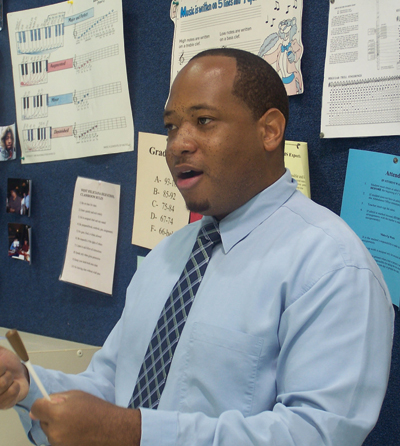
Most Memorable Student
I had a tuba player who indicated to me that his life changed after making a local honor band. In traveling to the event, it was his first time staying at a hotel. After coming back to the school, he told me about his inspiration now to attend college (previously he just wanted to work in the area after graduation).
Most Important Skill
I have learned to be patient and persevere. This is easier said than done, but the focus should be on the journey with the destination being the icing on the cake. It took me a while to grasp and understand this fully.
One Change for Music Education
I would change the extreme competitive nature within the field. People sometimes put ratings over the performance quality and are afraid to share and collaborate with others in order to have a competitive edge.
Fred David Romines
Marywood University, Penn.
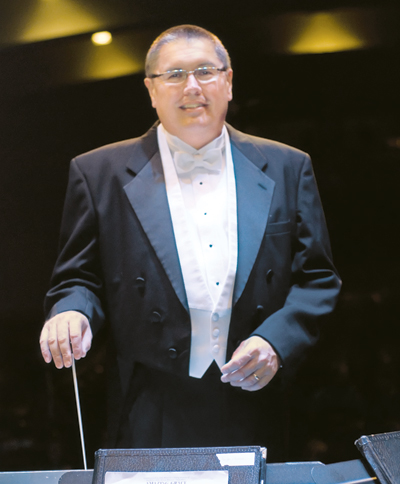
Most Memorable Student
My mind tends to organize students into chapters that correspond with my career, and every chapter features extraordinary individuals. I simply do not have a most memorable student, but here is a story of someone who had a profound impact.
One of my former high school students suffered a horrible accident that left her upper left leg shattered. After months of therapy, she was able to stand long enough to participate in marching band as a performer in the front ensemble. This student was a great brass player and the next year she took a spot on the field. As I watched her that fall, you could see her limp worsen during long rehearsals, but she was always there musically and made every set.
At our last marching competition that season, I happened to be on field level to see the band perform. It was one of those special performances where everything fell into place and several moments were the best ever. As the show was building toward the end with increasing tempi and high velocity maneuvers, here she came leading her rank to the end, taking the optional high parts in the music – all without a sign of a limp. It was hurting her and you could see it on her face, but she finished strong. I cried on the sideline and wondered if I had ever worked that hard as a director. That moment inspires me to this day.
Most Important Skill
The strategy that has never let me down is to maintain an enthusiastic attitude in before, after, and during the rehearsal while providing solid instruction. I maintain a high energy level in rehearsals and strive to be a champion for music. The benefits of detailed planning and preparation can be neutralized quickly if the teacher’s presentation is lifeless. My rehearsals are efficient and there are never times when the pace slackens for an extended period. My typical rehearsal is well planned with periods of intense and pointed instruction. However, rehearsals will often have lighter moments, and one will often hear laughter from everyone in the room. I seldom adopt a hardnosed line with the students, but work to achieve ensemble goals in the most sensitive and uplifting manner.
One Change for Music Education
I would like to see less emphasis on competition and the external benefits of music and total commitment to building a generation of music doers. I feel music can stand alone as worthy of our efforts while additional benefits are a bonus.
Greatest Memory
My greatest memory was hearing the local high school band perform when I was a fifth grader. I played the saxophone in an area elementary school (actually the smallest school pushed way over in the corner of the district). There were only a few students in our band, but I feel I was fairly proficient on the alto II part to Castles in Spain and Marching to Pretoria. That spring, at the area combined band concert, I heard our high school band for the first time. I didn’t know the names of several instruments or how the sound was produced, but I was hooked that day and have never stopped my love for bands and band music. It thrills me to see a young person become enthralled by the sights and sounds of a band – my first instinct is to jump in and help.
Balance of Work and Personal Life
I have gotten much better at this over the years. Early in my career, I felt the need to do everything. I remember talking to Ray Cramer about this problem, and I followed this advice. I made every effort to be home during prime family time in the evenings – even if it meant going back to the office at night or bringing a project home for work at night. I might get up early and work on the weekend, but would try to make time later in the day for family. I also tried to include family in band activities when practical.
Gerry Miller
Wakeland H.S., Frisco, Texas
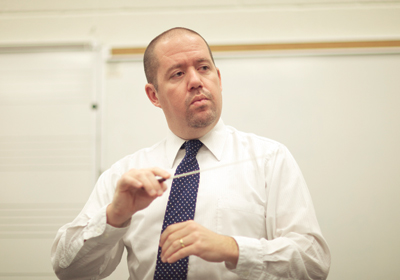
Most Memorable Student
The most memorable student I have taught is currently in my band program – my oldest son. One of the great joys of my life has been fatherhood, and having my son – a talented tuba player – in my ensembles has been a thrill. Throughout my career, I have seen many students matriculate through the high school program, but to watch my son’s musical transformation from a beginner to his current level has been inspiring. Often, band parents tell me that they are moved by seeing their son or daughter on the marching field or in a concert. I am now fortunate to say that I’ve been moved to tears by how incredible a young man he is becoming.
Most Important Skill
Every student is in our ensembles for a reason. While I do not always know what brings them to band each day, With each small interaction with every student every day, I seek to find what has brought that student-performer into my path that day. For many weeks, and even years in some cases, our interactions may be small and, in many respects, simply polite interaction. If we view each student’s purpose in our program (and in our life) as having a purpose beyond making music, we can play a vital role in revealing the magnificent human being they are becoming.
One Change for Music Education
I would like to see more collaboration among band programs. I wish that we would create time to hear each other’s ensembles, and support all student who sacrifice so much to be a part of our ensembles. Often, the competitive nature of our activity prevents us from showing our vulnerability as teachers and ensemble conductors. While bringing in clinicians is purposeful, it can help even more to work with colleagues across town who are conquering the same obstacles on a daily basis. I hope that we can reach out to assist one another more often by placing all student-performers ahead of our competitive instincts.
Greatest Memory
I vividly remember my first conducting experience, and it had a tremendous impact on my life. As a 7th grader, I asked my band director, Ms. Keller, if I could conduct a piece with the middle school band, and she agreed to not only let me conduct in a rehearsal, but to allow me to lead the ensemble on one piece at our school carnival performance. I prepared diligently by doing some rudimentary score study with my highlighters, color-coding all the melody and accompaniment parts, and practicing my 44 pattern in the mirror for hours. The day of the carnival performance, I conducted the band, and at age 12, I knew that I had found my calling.
Balance of Work and Personal Life
I am incredibly fortunate to have a very compassionate wife who spent many years as a successful band director. After our second son was born in 2007, she shifted her focus to youth ministry, and with a slightly different career calendar, we are fortunate to be able to balance our commitments effectively. I think the most important ingredient in a successful family, as well as a successful career, is compassion and understanding. I feel blessed to have a wife who supports my career goals while knowing that all of the extra time that both she and I put in contributes to the character development of so many children – in my band program and in her youth ministry.
I should also add that it is vitally important for directors to raise their kids around the band. From the time they were very young, my boys were adopted by the band students. I know that some want separation between work life and family life, but having my children grow up around the band has been incredibly rewarding for my family as well as my program.
Thomas Lizotte
Cape Elizabeth H.S., Maine
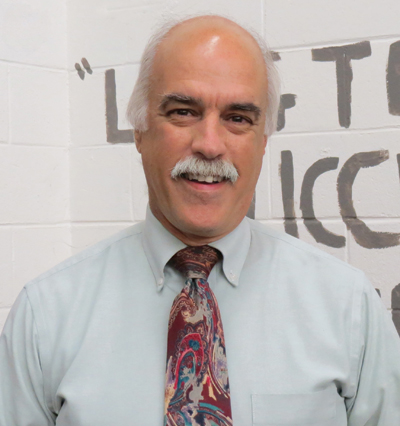
Most Memorable Student
There have been so many, but most memorable may be Jimmy Greene, a saxophone player I had the year I taught in Bloomfield, Conn-ecticut. Jimmy went on to play with Horace Silver and Harry Connick, Jr. He is memorable because, besides being a real talent, he is humble, spiritual, and a great person. He taught me that the best artists have all of these qualities.
Most Important Skill
People skills are essential for building a music community. I have learned that the most important classroom management skill is the care and handling of students.
One Change for Music Education
I would change the perception that music is somehow a lesser academic subject. We can battle this perception successfully if we work to teach the whole student. Music is, to me, a very powerful means; the end is the development of young minds and the fervent wish that they make the future better.
Greatest Memory
I will always remember my first Multiband Concert under Bill Rowell at the University of Massachusetts. I was 28 years old and had never been in a band concert. The thrill of Chorale and Capriccio under his direction still is with me.
Balance of Work and Personal Life
When work is done, I enjoy reading a good book, having a good meal with friends, and reflecting on how lucky I am to have been given a chance to influence young lives.
Brian Anderson
Freemont High School
Nebraska
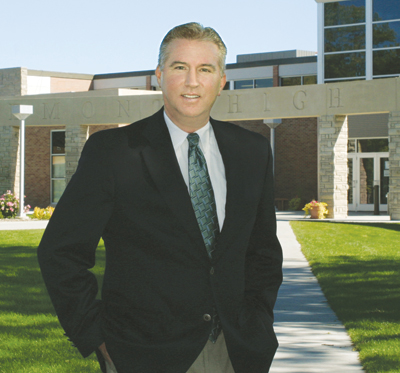
Most Memorable Student
As a young teacher, I once had a student who as a high school junior struggled to play a Bb scale. She never seemed to have her act together and often after a band event would have to wait for over an hour before someone would come to pick her up. I often wondered why she stayed in band; it didn’t seem as if she was contributing much to the organization or to her own musical education. I later found out that she came from a troubled home with a lack of parental support.
In addition, I discovered it was often one of her mother’s friends who picked her up after performances. I felt so sorry for her and ashamed of myself that it changed my entire attitude toward students. When she graduated she sent me the most wonderful note saying that while she knew she was not the best player she was so proud to be in the band and that it was the greatest experience of her life. She also wrote that I was the only positive role model she had ever known. This student taught me much more than I ever taught her. I still have the note.
Most Important Skill
The old adage that “students will not care how much you know until they know how much you care” is true. You have to be able to reach them before you can work the magic. With all of the choices kids have for classes, co-curricular, and extra-curricular activities, how you treat people may be the single most important part of our jobs. This includes how we interact with colleagues, support staff, parents, and administrators. From a musical standpoint there is no substitute for a solid foundation in fundamentals and thorough preparation.
One Change for Music Education
I would like to change scheduling. It seems as more and more educational mandates come down from above, there is less time for music. At the elementary and middle level the problem is reduced instructional time. The rationale is that students need to be in core subject areas for longer periods of time for better retention (translation: to achieve higher test scores). Numerous studies have suggested that instrumental music students leaving the classroom for music instruction often have higher scores than their classmates, yet this does not seem to matter to administrators. At the high school level it is programs such as ever-increasing graduation requirements that exclude music, cooperative classes where students can earn college credit, single sections of required or honors courses, and weighted grading scales. Scheduling concerns also include competing with other co-curricular and extracurricular activities outside of the school day. All of these obstacles will need to be addressed for music education to remain viable.
Greatest Memory
In high school I sang in the Nebraska All-State Choir conducted by Weston Noble. It was a life-changing experience and helped lead me to music education as a profession. The gorgeous sound he got out of that choir is still in my head after 35 years. As a teacher, it would be when my Symphonic Band performed at the MENC North Central Conference. We worked so hard and the students played their hearts out. It was an unforgettable experience.
Balance of Work and Personal Life
In our profession you have to make time for the ones you love. This job can consume you if you do not make a conscious effort to balance your life. We take a summer vacation together mixed in with some smaller 1-3 day trips closer to home during different times of the year. My wife and I have a date night once a week during the school year and take frequent walks with our dog.
Jim Shaw
Willow Wood Jr. H.S.
Tomball, Texas
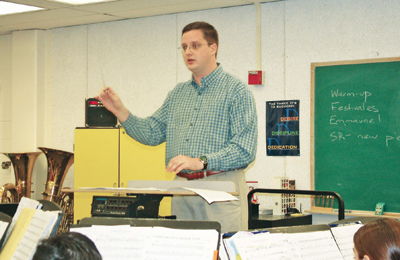
Most Memorable Student
During my first year as a middle school band director, I followed a popular director at a school in Midland, Texas. It was a rough transition, and there were times when I questioned if I was doing the right things and if I should return to the school the following year.
In October the school newspaper ran an interview with a seventh grader who was student of the month. She said that the best part of her day was her band class. She could not wait to get to the band hall everyday, and she hated how fast the time went by when she was there. Just knowing that one student in that group loved band enough to proclaim it to the masses was like getting a shot of B-12. I felt like I was supposed to be there and suddenly knew that it was all going to work out.
Most Important Skill
You have to be able to capture the kids’ attention. No matter how great the information that you teach may be, it does not matter unless students absorb it. Classroom management and pacing are critical for players to buy in to what you are working together to accomplish.
One Change for Music Education
It would be great if directors had more of an opportunity to go out and watch each other teach. I don’t know how that would be accomplished, but we all have so much to offer each other. That benefits everyone; especially our students.
Greatest Memory
My daughter took up saxophone in 6th grade. I will never forget walking into the living room and seeing her sitting there with her saxophone in the case, waiting for her first lesson. I almost teared up as I started thinking about all of the great experiences that were ahead of her at the start of her public school band career.
Balancing Work and Personal Life
I try to stay as organized as possible when at work, and remember that if everything doesn’t get done by the end of the work day, it’s not going anywhere. l
